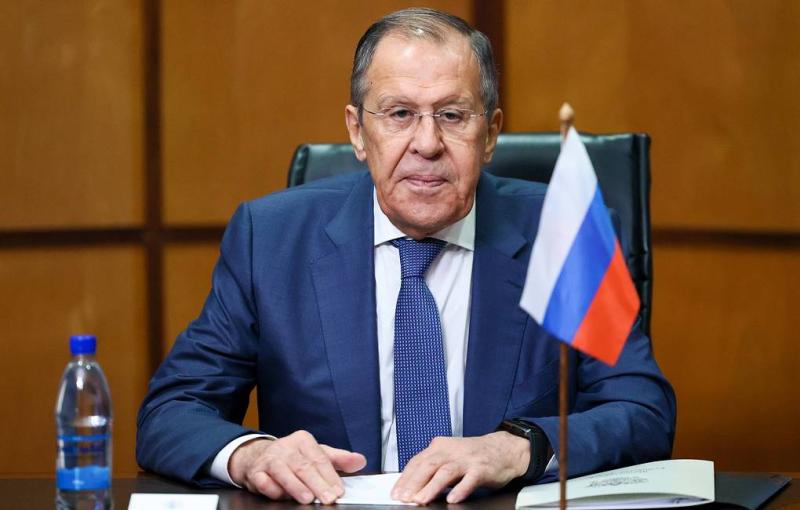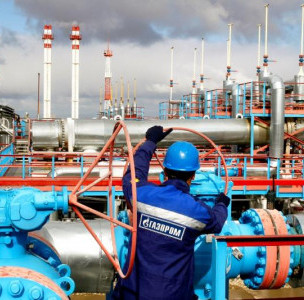
© Russian Foreign Ministry/TASS
Top stories from the Russian press on Monday, February 13th, prepared by TASS
Russia is adapting to oil sanctions, why inspections under the New START treaty are stuck in the mud, and Lavrov reveals prospects from his African tour. These stories topped Monday’s newspaper headlines across Russia.
Nezavisimaya Gazeta: Russian government finds ways to respond to oil sanctions
Decreasing oil production is the most sensible strategy for Russia under the conditions of a sanctions war, as Nezavisimaya Gazeta wrote last spring, citing economists from the Academy of Sciences. Less than a year later, the Russian government decided that cutting oil production was necessary. The West’s sanctions increased the discount on Russian oil by more than 40% and reduced Russia’s revenues.
After a record-setting budget deficit in January 2023, the Russian government began to act: it announced a cut in oil production, and reviewed oil taxes and "buffer payments" from the budget to oil companies. It presented the new parameters of mutual settlements to the oil industry on Sunday.
"Since nobody knows exactly how prices for Russian oil are being shaped nowadays, we had to choose from two options," Stanislav Mitrakhovich, a senior expert at the National Energy Security Fund told the newspaper. According to him, one of the options was creating a huge bureaucratic apparatus to track all oil deals but the more viable one was chosen. The government is going to proceed from the premise of the suppliers’ presumption of innocence, while taxes for them will follow a very simple and clear formula with a certain discount on the price for Brent which, as opposed to Urals, is shaped by the stock market.
Accordingly, if companies manage to sell at an even lower discount, this will be their additional profit. If they sell at a discount higher than the established one by the Finance Ministry, then they may experience losses, but this will be an additional incentive to work harder and seek more optimal sale chains. "This mechanism is being approved in a pilot mode for a couple of months and will be modified depending on the situation," the expert explained, adding that changes in calculating the dumping mechanism will also benefit the Russian budget.
According to Bloomberg, the redirection of Russia’s export flows has been rather successful - the export of crude to China, India and Turkey has reached a new high of 3.29 mln barrels per day over four weeks to February 3. According to Central Bank Governor Elvira Nabiullina, on the one hand, the worsening of foreign trade conditions and lowered prices for Russian oil are noticeable, on the other hand, the economic situation is better than forecasted back in October. According to her, transport infrastructure "where state investments are playing an increasingly more important part" is developing rapidly. "The economy is actively adapting to the unfolding changes," Nabiullina noted.
Izvestia: Why inspections under New START weren’t resumed
There is no progress in Russia-US dialogue on resuming inspections of nuclear facilities within the framework of the Strategic Arms Reduction (New START) Treaty. However, during closed-door talks, Moscow read out a five-page document to Washington reiterating all the provisions of the agreement, sources in diplomatic circles told Izvestia. As Moscow noted, the West’s sanctions policy, which resulted in the closure of airspace as well as the termination of the issuance of visas, prevented the participation of specialists from Russia in inspections and Russian diplomats in consultations. That said, the US Embassy in Russia has assured that Washington is still ready for constructive cooperation in the implementation of the treaty.
The fact that the issue has not been resolved for a while as well as the US’ previous decisions in the sphere of arms control casts doubt on New START’s future. According to Junior Researcher of the Center for International Security at the Institute of World Economy and International Relations (IMEMO) of the Russian Academy of Sciences and an expert with the Russian International Affairs Council Vasily Klimov, the situation regarding the New START deal was triggered by yet another crisis of mistrust at the highest political level. Additionally, this involves the domestic political struggle between the Republicans and the Biden administration. "The Republicans’ aim to dismantle agreements and in their usual fashion cranks up pressure on Biden but even with a less favorable situation it is not expected that the administration will discontinue the New START deal," he told Izvestia.
Deputy Speaker of Russia's Federation Council Konstantin Kosachev reiterated that the New START remains practically the only document between Russia and the US in this sphere.
"It is the most important one and without any doubt it should be preserved. Russia has been giving it its all here. We will strive for the US to scrupulously comply with the provisions of this agreement. The most important thing here is the absolute equality of the parties, as well as their obligations and rights under this agreement. This also concerns the inspections," he said, adding that he hoped that the US won't make any reckless unilateral steps like with some other agreements.
According to Klimov, with time, the sides should resume the inspections because the treaty ensures predictability which allows them to dynamically assess each other’s strategic potential and be confident in the absence of a mutual opportunity to strike. He pointed out that in the absence of this opportunity, a process of an unlimited arms race will be launched and the risks of a nuclear escalation will significantly increase. However, according to the expert, the sides would like to avoid this scenario. According to him, the situation will be resolved with time but in order for this to happen it is necessary to activate interaction among military and political representatives.
Vedomosti: Lavrov finds new opportunities for Russia in Africa
From February 7 to 9, Russian Foreign Minister Sergey Lavrov visited Mali, Mauritania and Sudan and earlier, on January 23-27, he was in South Africa, Eswatini (former Swaziland), Angola and Eritrea.
Lavrov’s African tour was perceived as a significant international event both in Russia and abroad, notes Russian International Affairs Council Director General Andrey Kortunov. According to him, Moscow is actively participating in the battle for the hearts and minds of the "global South" because for world powers these countries are important due to their sheer number and their activity on the global stage. Undoubtedly, Lavrov’s visit also had a practical goal, namely, laying the groundwork for the Russia-Africa summit. Nevertheless, Lavrov individually discussed with the countries he visited matters covering technical cooperation as well as major economic projects. According to Kortunov, nowadays, Africa is a "continent of opportunities" with a rapidly growing demographic potential. The US, the EU and China are also vying for influence in that region so Moscow simply cannot stay on the sidelines, the expert concluded.
Russia has had a comprehensive approach to working with Africa since 2019, according to Senior Instructor of African Studies at St. Petersburg State University Alexander Zdanevich. Moscow’s current stepped-up activity in the region is apparently related to the upcoming Russia-Africa summit, so with his visit Lavrov was preparing the groundwork for a detailed conversation at the highest level. According to the expert, the discussion will be generally focused around the so-called "troika": energy, "soft power" and military and technical cooperation. The latter is particularly important, given the African countries’ need for security and Russia’s strong positions in this sphere. The expert added that Russia has earned a good reputation in Africa as a force that is capable of ensuring the security of African countries at a distance and under various political conditions without meddling in their domestic affairs. As a result, concerning security issues, Moscow commands respect which surpasses even that of China, the expert concluded.
Vedomosti: Turkish opposition blames government for country’s dire post-quake plight
Turkey’s six-party opposition coalition has lashed out at Turkish President Recep Tayyip Erdogan for mishandling the aftermath of the February 6 earthquake. The opposition links the enormous number of victims and the devastation with the government’s inefficient actions.
Apparently, the opposition is trying to use this catastrophe to score pre-election points, says Senior Researcher at the Russian Academy of Sciences’ Primakov Institute of World Economy and International Relations Viktor Nadein-Rayevsky. Opposition politicians and reporters have been openly saying lately that Erdogan "was ushered in with an earthquake and will leave with an earthquake," comparing the predicament to a similar disaster in 1999 which launched Erdogan’s rise, the expert reiterated.
Russian International Affairs Council expert Kirill Semenov thinks that Erdogan and his party will use this emergency for their own benefit. "The Turkish president has everything, including administrative resources provided by the natural disaster. This is both the state of emergency in southeastern provinces, and the right to provide emergency financial aid, and extraordinary measures in punishing those guilty of violating construction norms," he says. The opposition’s accusations will be presented by the authorities as something immoral, the expert thinks.
Amur Gadzhiev, a researcher at the Russian Academy of Sciences' Institute of Oriental Studies, points out that the opposition still has not selected a single presidential contender for the coming elections slated for May or June. Nor does it have any clear formulas for handling the disaster’s aftermath or plans for economic and political reforms besides the return to a parliamentary republic from a presidential one, he added. The six parties got united in criticizing Erdogan and his party for violations which led to the loss of life which allowed them to retain their shaky bloc. That said, this limits their opportunities to create a positive agenda, particularly at the current critical moment, the expert says, pointing out that Erdogan has already started handing out various payments and compensation.
Nezavisimaya Gazeta: Russia launches repartition of global energy market
The export of natural gas from Russia to Uzbekistan may kick off as early as March 1, 2023 as was mentioned at a trilateral meeting between Gazprom CEO Alexey Miller and the energy ministers of Kazakhstan and Uzbekistan in St. Petersburg. The Uzbek Energy Ministry specified that the meeting had focused on the technical issues of Russian gas deliveries. An agreement on the matter was signed this January.
As economist and politician Pyotr Svoik told Kazakhstan’s ZONAkz web media outlet, the process of reformatting the global energy market had been launched. Moscow is launching reverse gas deliveries along the existing Central Asia - Center pipelines to Turkmenistan and on to China. This will make it possible to load the pipeline, which is currently used only 30% for domestic needs, and increase gas supplies in the direction of southern Kazakhstan and Uzbekistan.
"So, creating a ‘gas union’ is not just an economic project but also a geopolitical one with which Gazprom will successfully compensate for all its problems with Europe. If these ‘gas rivers’ are redirected to Central Asia and TAPI (Trans-Afghanistan Pipeline) is also built, and Gazprom has more than enough capacities, then it is possible to increase gas deliveries to China, and to Afghanistan, and on to Pakistan and India," the expert noted.









